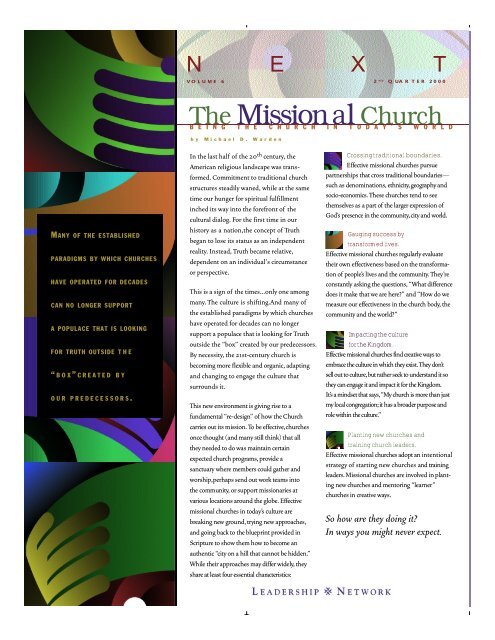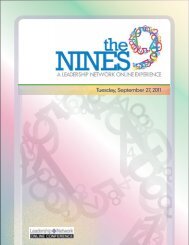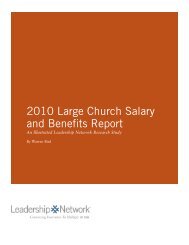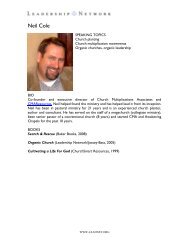ARE WE A PEOPLE AT HALF TIME? - Leadership Network
ARE WE A PEOPLE AT HALF TIME? - Leadership Network
ARE WE A PEOPLE AT HALF TIME? - Leadership Network
You also want an ePaper? Increase the reach of your titles
YUMPU automatically turns print PDFs into web optimized ePapers that Google loves.
N E X T<br />
V O L U M E 6 2 N D Q UA R T E R 2 0 0 0<br />
The Mission al Church<br />
B E I N G T H E C H U R C H I N T O D A Y ’ S W O R L D<br />
b y M i c h a e l D . W a r d e n<br />
MA N Y O F T H E E S T A B L I S H E D<br />
P A R A D I G M S B Y W H I C H C H U R C H E S<br />
H A V E O P E R A T E D F O R D E C A D E S<br />
C A N N O L O N G E R S U P P O R T<br />
A P O P U L A C E T H A T I S L O O K I N G<br />
F O R T R U T H O U T S I D E T H E<br />
“ B O X” C R E A T E D B Y<br />
O U R P R E D E C E S S O R S .<br />
In the last half of the 20 th century, the<br />
American religious landscape was transformed.<br />
Commitment to traditional church<br />
structures steadily waned, while at the same<br />
time our hunger for spiritual fulfillment<br />
inched its way into the forefront of the<br />
cultural dialog. For the first time in our<br />
history as a nation,the concept of Truth<br />
began to lose its status as an independent<br />
reality. Instead, Truth became relative,<br />
dependent on an individual’s circumstance<br />
or perspective.<br />
This is a sign of the times…only one among<br />
many. The culture is shifting.And many of<br />
the established paradigms by which churches<br />
have operated for decades can no longer<br />
support a populace that is looking for Truth<br />
outside the “box” created by our predecessors.<br />
By necessity, the 21st-century church is<br />
becoming more flexible and orga n i c, a d a p t i n g<br />
and changing to engage the culture that<br />
surrounds it.<br />
This new environment is giving rise to a<br />
fundamental “r e -d e s i g n” of how the Church<br />
carries out its mission. To be effe c t i v e ,c h u r c h e s<br />
once thought (and many still think) that all<br />
they needed to do was maintain certain<br />
expected church progra m s ,provide a<br />
s a n c t u a ry where members could gather and<br />
w o r s h i p ,p e rhaps send out work teams into<br />
the community, or support missionaries at<br />
various locations around the globe. E f fective<br />
missional churches in today’s culture are<br />
breaking new ground, t rying new approaches,<br />
and going back to the blueprint provided in<br />
Scripture to show them how to become an<br />
authentic “city on a hill that cannot be hidden.”<br />
While their approaches may differ widel y, t h e y<br />
share at least four essential chara c t e r i s t i c s :<br />
Crossing traditional boundaries.<br />
E f fective missional churches pursue<br />
partnerships that cross traditional boundaries—<br />
such as denominations, e t h n i c i ,g t ye o g raphy and<br />
s o c i o-e c o n o m i c These s . churches tend to see<br />
t h e m s elves as a part of the larger expression of<br />
Go d ’s presence in the community,city and worl d.<br />
Gauging success by<br />
transformed lives.<br />
E f fective missional churches regularly evaluate<br />
their own effectiveness based on the tra n s fo r m a-<br />
tion of p e o p l e’s lives and the community. T h e y’r e<br />
constantly asking the questions, “What difference<br />
does it make that we are here” and “How do we<br />
measure our effectiveness in the church body, t h e<br />
community and the worl d ”<br />
Impacting the culture<br />
for the Kingdom.<br />
E f fective missional churches find creative ways to<br />
e m b race the culture in which they exist.They don’t<br />
s ell out to culture,but rather seek to understand it so<br />
they can engage it and impact it for the Kingdom.<br />
I t’s a mindset that says,“My church is more than just<br />
my local congrega t i o n it ; has a broader purpose and<br />
role within the culture.”<br />
Planting new churches and<br />
training church leaders.<br />
E f fective missional churches adopt an intentional<br />
strategy of starting new churches and tra i n i n g<br />
l e a d e r s .Missional churches are involved in planting<br />
new churches and mentoring “l e a r n e r”<br />
churches in creative ways.<br />
So how are they doing it<br />
In ways you might never expect.







